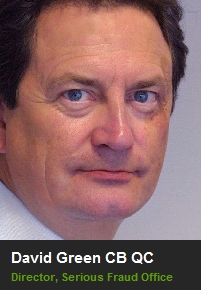News & what's on - Written by Barry & Richard on Sunday, March 9, 2014 4:47 - 0 Comments
“I cannot help you on ethics” says David Green. We don’t believe him.
 Speaking last week David Green, Director of the Serious Fraud Office reinforced the message that the SFO will not follow in the footsteps of the US in offering advice or guidance when it comes to compliance.
Speaking last week David Green, Director of the Serious Fraud Office reinforced the message that the SFO will not follow in the footsteps of the US in offering advice or guidance when it comes to compliance.
Speaking at a conference organized by PWC he said:
“The question I am asked to address presupposes that it is the function of law enforcement to define a good ethical business culture and to educate people towards that goal.
That expectation causes me some problems.
The role of the SFO is to investigate and to prosecute the topmost tier of serious and complex fraud and bribery…
…We totally get the importance of generating trust and, in the right circumstances, legitimate expectation based on a track record of our dealings with companies who self-report.
But the SFO is not a regulator, an educator, an advisor, a confessor, or an apologist. I am not funded for any of those activities.
The SFO is a law enforcement agency dealing with top end, well-heeled, well-lawyered crime. We enforce the law in our specialist field.
It follows that I am not here to preach. The SFO does not do lectures on ethics. We do not issue guidance on how not to rob banks. I would not dream of telling you how I think you should behave.
It is for business and senior managers to decide appropriate standards of ethics and integrity in their commercial activities.
They have access to the best expertise and advice available from the law and accountancy sectors of the Bribery Act industry. That advice would doubtless take account of the legitimate profit motive, and the interests of employees, shareholders, investors and pensioners.
So I cannot help you on ethics.” [our emphasis]
This echoes what David Green told us in October last year, namely that compliance with the Bribery Act for UK companies was not his problem.
The US law enforcement model on compliance issues is a useful model. Broadly, corporate culpability is impacted by the existence of a compliance and ethics policy. Over the years a practice has developed of adding an Appendix within Deferred Prosecution Agreements which flags US law enforcement view of an adequate compliance program for the relevant company. More recently in 2012, the DOJ and SEC published the FCPA guide which was the product of its learning over the years and included, for example:
- Commitment from Senior Management and a Clearly Articulated Policy Against Corruption
- Code of Conduct and Compliance Policies and Procedures
- Oversight, Autonomy, and Resources
- Risk Assessment
- Training and Continuing Advice
- Incentives and Disciplinary Measures
- Third Party Due Diligence and Payments
- Confidential Reporting and Internal Investigation
- Continuous Improvement: Periodic Testing and Review
- Mergers and Acquisitions: Pre-Acquisition Due Diligence and Post-Acquisition Integration
These high level indications were backed by 130 pages of detail representing the combined experience of US law enforcement in the DOJ and SEC over the years.
Opinion
Mr. Green’s hardline “that’s your problem” is an oversimplification and for those with a keen eye there is already help…
In determining whether there is a case to prosecute, and if there is, whether any case merits a DPA (as opposed to straight forward prosecution) UK government guidance demands that compliance programs, their effectiveness or the lack of them must be taken into account by the SFO. These will, just like the examples in the US, over time become a useful guide.
Already, the UK DPA Code of Conduct, published by the Serious Fraud Office lists out 18 possible elements of a compliance program!
Mr Green doth protest too much we thinks.


